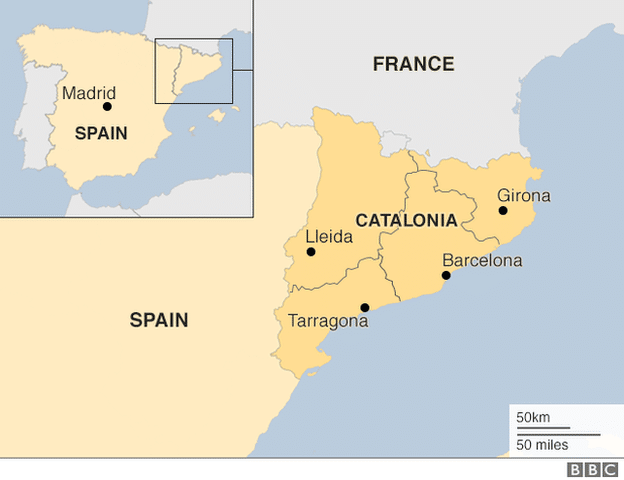
These are some of my thoughts on the Catalan independence movement.
The first version of this article was written in October 2019, when we experienced some pretty outrageous scenes in Barcelona due to the violent protests following the sentence handed out to the politicians who were behind the separatist movement that held a unilateral referendum and declared Catalunya independent from Spain in 2017.
As always, I speak from the heart and without any filter. My thoughts and feelings come from a place of neutrality seeking common sense. I do have many Catalan friends and have absolutely no problem with the population in general. I’ve even learned Catalan myself out of my own interest and have nothing against the language itself. I always welcome learning more languages, albeit with the right priorities. I love life in Barcelona, but think it could be better if these independence shenanigans were put to rest once and for all.
The historical basis for independence
Most separatists seem to think that in the past Spain conquered Catalonia and has since then kept it reigned in by the use of force in a fascist way. This is simply false.
Spain is the result of the merger of 3 Kingdoms: Castile, Aragon and Navarra. Only Navarra was conquered by force. Aragon included Catalonia, Aragon, Valencia and the Balearic Islands. The merger between the crowns of Castile and Aragon in the 1480s was voluntary and served the interests of both monarchies.
The only time in which a full-fledged invasion and conquest succeeded was at the end of the War of Spanish Succession, ending on 11th September 1714 when Barcelona fell to the combined armies of Castile and France, not Spain as such. The Kingdom of Spain as a totally unified juridical entity, as opposed to a composite monarchy, started to exist at that date so, technically, Spain could not have invaded Catalonia.
Secessionists talk endlessly about the events of 1714, when the detested Phillip V’s troops blasted Barcelona into submission at the end of the War of the Spanish Succession. Rarely if ever mentioned are the events of 1701 & 1705, when the very same Phillip V was welcomed into Barcelona and crowned King of Aragon & Count of Barcelona by Catalonia’s assembled representatives. The official State Bulletin of the Kingdom of Aragon published an Act of the coronation, in the Catalan language (incidentally, Phillip was numbered ‘IV’ instead of ‘V’, as the first of the Phillips was only king of Castille, never of Aragon). Five years later, in 1705, the same Catalan politicians decided to ignore their earlier oaths of loyalty to their king and instead transferred their loyalties to Archduke Charles, a Habsburg pretender. At the time it looked like a winning bet, but the war was eventually won by Phillip de Bourbon and Catalonia thus found itself on the losing side of the conflict. If they’d have remained loyal to Phillip all along, subsequent history might be very different and 1714 would never have happened.
Another wonderful, albeit false, legend related to 1714 has Barcelona’s chief executive authority (Rafael Casanova) defending the city to his last dying gasp as the Bourbon troops of Phillip V proceeded to break through the walls and mercilessly crush Catalan resistance. To this day, homage is paid to this peculiar hero every year on the date the city fell, 11/Sep., an act of obligatory participation by all leading Catalan politicians. In actual fact, the real R.C. deserted his post when it was clear the battle would be lost, and escaped the city disguised as a monk. He lived a further 29 years, practicing law a nearby town with the full knowledge of Madrid’s authorities, who granted him a cozy amnesty a few years later. He died in 1734.
The economic case for independence
Leaving the tales of history aside, perhaps a slightly more valid cause for claiming independence would be the economical abuse of Catalonia from the rest of Spain, and particularly Madrid. This is what many separatists keep repeating. They paint Catalonia as a paradise with hard-working people, economical and cultural riches. They claim that Spain is usurping all the good things from Catalonia for the benefit of Madrid and other regions in Spain. Let’s see if this holds up.
The number of cases of corruption is among the top 3 regions, with some of the worst scandals in recent history. During decades, the corrupted political rulers of Catalonia, exemplified by the former President’s family, the Pujols, have sacked the hard-earned taxes of Catalans and Spaniards, extorting businesses and industries who wanted to apply for regional projects. This system, known as «el tres por ciento» (literally, «the three percent») is now being prosecuted in courts of Law, exposing the dark side of corruption in Catalonia. The entire Pujol family, and many Catalonian politicians are being investigated, some having been sent to prison, in an embezzlement case of over €1 billion in total.
Spain is not robbing Catalonia. Madrid actually transfers more of its GDP to other less-developed regions in Spain that Catalonia does. At least for other regions have a higher per capita income than that of Catalonia, so there goes the myth of Catalans somehow being superior and more hard-working than the rest of the Spanish people.
Catalonia also imposes the most and highest taxes amongst all Spanish regions. For example, wealth tax has been removed in Madrid, however it is still in force in Catalunya. Income taxes are also higher in Catalonia than in many other regions. They even introduced a tax on luxury items.
Catalonia, which has twice as many regional taxes when compared to the rest of the Spanish regions, ranks last in the Tax Foundation’s 2020 Spanish Regional Tax Competitiveness Index, a feat which they repeated in 2021. In 2020, a new tax on amenities with an environmental impact was ratified after the tax on the environmental hazard of radio-toxic elements was declared unconstitutional. Catalonia also reduced the inheritance tax credit and raised the marginal income tax rate by up to two points. Additionally, it has one of the worst-structured individual income and wealth taxes.
The mismanagement of the economic downturn by the Catalonian government, which focused more on the cause of independence than on the everyday-life problems of catalans, has had the effect of impoverishing Catalonia while other less affluent regions, like Madrid, Baleares, or the Basque region have grown strongly as Spain started recovering in 2015. In fact, Catalonia has been helped by the Central government to surmount its crisis. Now the Catalonian debt has a junk rating on it. All of this has been a serious blow on the self-esteem of Catalans in general, and to blame others has been the only way their regional Government has found to cope with it.
There is no real economic basis, therefore, and the Catalan separatist movement is not original at all, in fact, it is part of a global nationalistic and populist trend that we’ve been seeing in the past 10 years.
Is a Catalan state even possible?
The feasibility of an independent Catalan state is pretty much null, so the whole argument of whether Catalunya should be independent or not is a non-starter in my opinion. I understand that some Catalans think that they pay too much taxes to the Spanish state and don’t receive enough benefits, and that the region had its language and culture suppressed under the Franco regime, but that’s really as far as it goes. It’s not a reason to claim independence.

The situation we have now is purely the result of a few politicians manipulating a big mass of people into believing that most of their problems can be blamed on Madrid and Spain, and a Catalan independent state is the solution. For anyone who is economically literate and knows some basic history of Spain this is very obviously a false concept. Politicians in Catalunya over the past few decades have been as corrupt as they come, so I don’t understand why they blame the politicians in Madrid for any problems here in Catalunya.
The claim by the Catalan politicians that they have every right to make a referendum for self-determination is ridiculous. Self-determination referenda are not allowed by the Spanish Constitution, precisely because the subject of our sovereignty is the Spanish Nation as a whole. This is pretty logical.
I’ve lived through something similar when I lived in Malta. In the early 00s the nation was split right along the middle on the question of whether the country should join the European Union or not. For anyone with any sense the answer was obvious, however as usual the whole thing got politicised with the Labour party taking the No camp and the Nationalist party taking the Yes side.
The Labour party promised they would make Malta the new “Switzerland in the Mediterranean”, assuring that the tiny island did not need any help from Europe going forward, and that membership would only result in Sicilians invading Malta and the country losing much of its culture and charm. Luckily the referendum was won (with a very slight majority) by the Yes camp and so Malta eventually joined the European Union, adopted the Euro and is now doing very well as a country economically.
In Catalonia, the politicians promise that with independence, the region will become the new “Denmark of the South”. Funny how things repeat themselves. Both in Malta’s case and in Catalonia’s, these are absolutely false ideas that are simply non-starters and only serve to manipulate citizens.
Are Catalans Oppressed?

The Catalan separatists paint themselves as an oppressed nation. Anyone who has visited or lived in Catalunya knows that this can’t be further from the truth. I find it highly insulting to the people who are really living in oppressive situations around the world, starting from the Palestinians on the Gaza strip not too far away.
If anything, the non-separatist people living in Catalunya should be considered oppressed, since you have to be careful how you talk in public about this issue or you might get insulted or assaulted. I learned that the hard way when I first arrived to Barcelona when I went out with a Spanish national football team t-shirt (I was unaware of the conflict) and was shouted at and insulted until someone explained to me what the problem was. I still find the incident ridiculous and it’s just a perfect example of the non-pacific and non-tolerant nature of many separatists, who go to great lengths to paint themselves as pacific protestors and as the victims in this whole situation.
Moreover, in all public schools, the Catalan language is given much more importance than Spanish. I don’t understand why a region that is so internationally involved would want to favor a little-used language in favor of Spanish, not to mention English. In fact, due to a rule barring anyone who doesn’t speak Catalan from a teaching position in public schools, most English teachers are actually Catalans with a limited knowledge of English and definitely no British or American accent, so people end up graduating with very basic to non-existent English skills.
I’ve had some people accuse me of spreading lies, insisting that both Spanish and English are taught in schools and students end up being trilingual or bilingual at worst. I’ll just leave a few links about that, judge for yourself:
- https://elpais.com/espana/catalunya/2021-11-23/la-justicia-tumba-la-inmersion-linguistica-en-cataluna-pero-la-generalitat-pide-a-los-centros-que-no-hagan-ningun-cambio.html
- https://elpais.com/espana/catalunya/2021-12-07/denunciados-por-amenazar-a-la-familia-que-pidio-el-25-de-lengua-castellana-en-la-escuela-para-su-hijo-de-cinco-anos.html
If you’re in Catalunya, just chat up any random teenager or young adult in English and see how well they speak the language. Those who do invariably have studied the language in private at one of the many private language centers in the city.
If you’re an expat with a family, you should seriously consider whether a move to Catalunya is right for you, unless you have the means to send your kids to international private schools. I know several expats who lament the fact that they didn’t plan around this factor, and now have kids whose first and main language is Catalan, which is the third or fourth language of their parents. This ends up limiting their interaction with their kids.
Having grown up in a school that taught me four different languages, I understand and value knowing more than one language, but you need to be practical in these matters. In Malta, natives speak Maltese between themselves, but would never dream of teaching academic subjects in Maltese or preferring it over the other national language; English. The reason is that English is simply vastly more useful in a globalized world. If you speak to parents who send their children to public schools, you will also hear stories of children being indoctrinated in Catalan culture over that of Spain or Europe, so there is a much higher chance of them growing up with a separatist mentality.
Catalan is also forcibly imposed on you in various ways. If you send any message to the authorities through their websites (like Generalitat.cat) in Spanish or English, you are likely to be responded to in Catalan. This happened to me more than once. Official letters are frequently only in Catalan, and the aforementioned Generalitat website curiously has a “bug” that changes the language to Catalan with every new page you visit, even after specifically using the language selector to select English or Spanish. Such impositions are not the right way to make non-Catalan speakers learn your language, but the use of force is the only way these people know. At the end of the day, very few people really want to learn Catalan unless they are forced to. There is simply no need for the language when Spanish is a much more useful language and we’re in Spain.
During this period of protests and violence, we have also seen universities being shut down by separatist students, preventing the rest of the students and teachers from entering their classes and proceeding with their education. Again, who is being oppressed here?







 When you are buying a new car it is essential to negotiate to get the best price possible. I used to hate this part as I don’t like negotiating. I prefer to know the real price of something and then decide for myself whether I can afford it or not.
When you are buying a new car it is essential to negotiate to get the best price possible. I used to hate this part as I don’t like negotiating. I prefer to know the real price of something and then decide for myself whether I can afford it or not.


